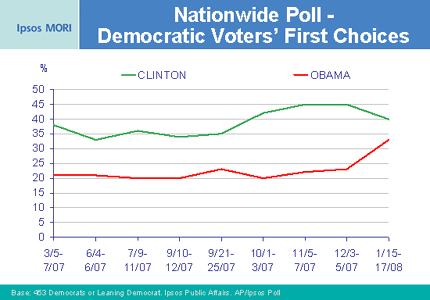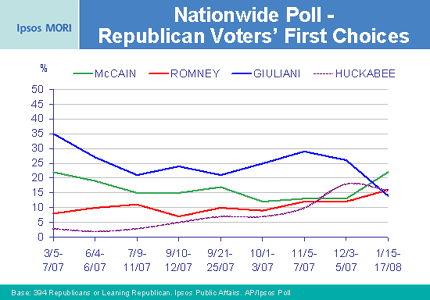Political Commentary - Super Tuesday
On Tuesday 5th February, the primary season reaches a crescendo as twenty four states vote simultaneously for their preferred presidential candidate. Much larger than any previous "Super Tuesday", the day's voting should see a clearer picture emerge of who each party's nominee will be.
The story so far
Since the opening contest, the Iowa caucuses in early January, the two fields have been substantially whittled down. Only two Democrats remain in contention for their party's nomination, Senators Hillary Clinton and Barack Obama. For the Republicans, the choice appears to be between Senator John McCain or Governors Mitt Romney and Mike Huckabee. All five have won at least one of the contests held thus far.

Obama upset Clinton, the pre-Iowa favourite and national poll leader, to win that contest. Despite polling suggesting a big win for Obama in New Hampshire a few days later, Clinton fought back to win the Granite State. After a tight contest in Nevada, where Clinton won the popular vote while Obama picked up more delegates for the national convention, the young Senator from Illinois scored a huge victory in South Carolina. While the polls had correctly predicted an Obama victory, they drastically underestimated the margin of that victory.

The Republican contests have seen three different winners. Huckabee, a jocular Baptist minister, surprised many observers with his Iowa victory. Romney won in Michigan and largely-uncontested Nevada, placing well elsewhere. John McCain fought back from a mid-year drop in the polls to win in New Hampshire, South Carolina, and Florida, establishing himself as the frontrunner going into Super Tuesday. Rudy Giuliani, who convincingly led in most national polls throughout 2007, failed to win anywhere and eventually abandoned his campaign.
You've got to be in it to win it
As late as December last year, Giuliani topped most national polls of Republican voters. He was "America's Mayor", the hero of 9/11, a moderate Republican, and seemed a formidable contender for the GOP nomination. However, having only seriously contested one state - Florida, where he finished a distant third - he has now dropped out of the race. How, in a matter of only a few weeks, has the national poll leader gone from hero to zero, from polling in the high twenties to the low teens?
Unfortunately, national polls reflect a sample of respondents who, according to data from the Pew Research Centre, simply do not pay very much attention to the primary contest. Local state polling in the early contests, in which he didn't compete, indicated that Giuliani was uncompetitive some time before he lost his lead nationally. Polling is done more regularly, respondents have an obvious incentive to pay attention to the race, and the results reflect the distinct political weather systems of each state. As Giuliani's fortunes fell, they mirrored those of McCain, the other "moderate" candidate, as he successfully battled through the early states. Another case of "you've got to be in it, to win it".
Maxing out the base
Mike Huckabee's surprise win in Iowa was based on the support of that state's evangelical or born-again community, who comprise around 60% of the Republican electorate, according to CNN's entrance polls. Nearly half of these evangelical voters supported Huckabee. However, according to the same entrance polls, he placed fourth amongst non-evangelical voters in Iowa. In New Hampshire, Huckabee finished third, receiving just 11% of the votes. There, Huckabee split the evangelical vote with the victorious McCain. Only among those who attend church more than once a week did Huckabee gain more votes than the other candidates.
Although placing a close second in South Carolina, Huckabee may have expected to do better amongst a highly religious electorate. Again, his support was drawn predominantly from the evangelicals and the highly religious but this time it was not enough in the face of McCain's emerging momentum, as the Arizona Senator gathered a range of different voters to his campaign, including the moderates and independents that form his core constituency. Huckabee's pre-Iowa polling "bounce" seemed to flatten out by the end of January while McCain's ascent continued unabated. Huckabee's coalition of supporters, if it could even be described as such, is rather limited.
Guess who's coming to dinner?
Although Hillary Clinton has maintained a strong national poll lead throughout the contest, she lost two of the four early contests to Barack Obama. Many of the early contests have seen huge turnout - in South Carolina, for example, Democratic turnout was around three quarters higher than in 2004. Pew's research suggests that Obama draws his support from wealthy, highly educated Democrats. Exit poll data supports this and suggests that he also attracts large numbers of young and first-time voters. Furthermore, as an African-American, Obama also draws huge support from the black community, with around four fifths of black Democrats voting for him in South Carolina.
This coalition of support, while fuelling Obama's insurgent campaign up to this point, may prove difficult to maintain on Super Tuesday. Younger voters are much less likely to turn out than older voters, who generally prefer Clinton. While Obama's extensive get-out-the-vote operations in the early states succeeded in mobilizing younger voters, this may not be possible to organise in the multitude of states who vote on Super Tuesday. In addition, many of these states do not have large black populations, further depleting the voters whom Obama has relied upon thus far.
What to look out for on Super Duper Tuesday
Given the huge number of states that will be voting, national polling may give a reasonable indication of how the races ultimately resolve themselves. The contest will likely be an "air war", fought on television and radio, as the sheer scale of the contest precludes extensive ground campaigning or "retail politics" of the kind seen so far. Geographical scale and the necessity of buying television advertising means financial clout becomes ever more vital.
This should be of little consequence in the Democratic contest, where Obama and Clinton have raised similar amounts. In the Republican contest, Romney's personal fortune may be crucial. Although he has won only twice so far, Romney has placed well in most other contests. Having positioned himself as a tick-all-the-right-boxes Reaganite (low-tax, pro-life, strong national defence, great hair), he is the preferred candidate to the party elite, who are wary of McCain's moderate stances on immigration and climate change and of Huckabee's economic populism. If Romney decides to spend heavily, he may yet halt McCain's momentum. If not, expect McCain to emerge as the presumptive nominee.
Turnout may be crucial amongst Democrats. Can Obama's campaign continue to draw younger and first-time voters? It may be unlikely, with less organisation available on the ground across all twenty four states. So, lower turnout ought to favour Senator Clinton.
Both turnout and television advertising are heavily reliant on a campaign's finances. To subvert an old clichй, it's the money, stupid.
Of course, as the distinction between national-level and state-level polling shows, each state has its own preferences and quirks. Hometown heroes, such as McCain in Arizona or Obama in Illinois, will have advantages in some places. In others, demographics will play a big part. Expect Obama to do well in states with large black populations and Huckabee to have some success in more religiously-inclined Southern contests, where his shoe-string operation will surely focus its efforts.
The behaviour of independent voters, unaffiliated to either party, will also be crucial. Fifteen of the twenty four states voting on Tuesday have some form of open voting, allowing independents to participate. Both McCain and Obama have strong appeal to this part of the electorate. Polling may be upset by independents delaying their decision about which party's elections to vote in. Perceptions of McCain as being unbeatable may lead independents towards the Democratic contest, boosting Obama's chances against Clinton while creating an opening for Romney's campaign.
All the way to the convention
Ultimately, the primary contest is all about collecting delegates for the national conventions which choose the nominees. The Democratic race is now a straight one-on-one contest. While neither candidate will have a decisive advantage the day after Super Tuesday, one of them will surely emerge better off than their opponent and with the elusive momentum which will ultimately push them to victory.
The Republican contest is more fluid. McCain appears to be the frontrunner, leads in most national and state polls, and is picking up heavyweight endorsements. However, if Huckabee and Romney stay in the race and pick up enough delegates, they will play a decisive role in choosing the eventual nominee. The days of smoke-filled rooms may be over but this contest could yet be decided by some Machiavellian manoeuvrings.



